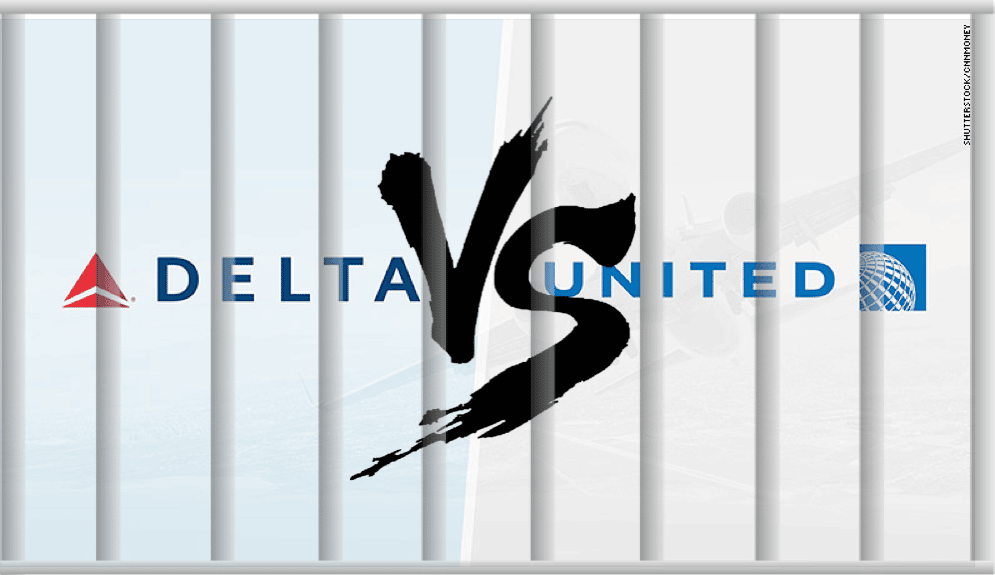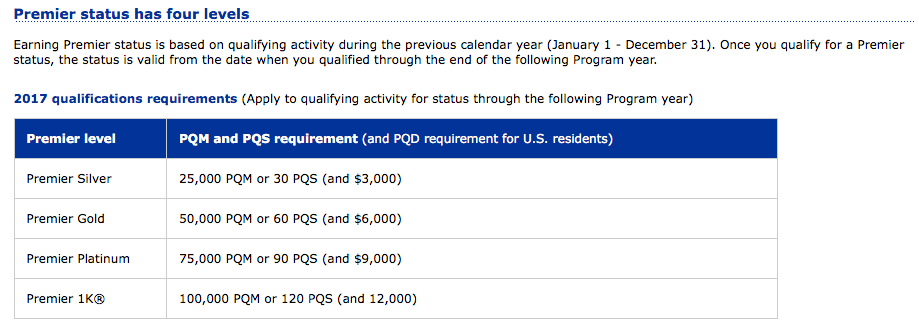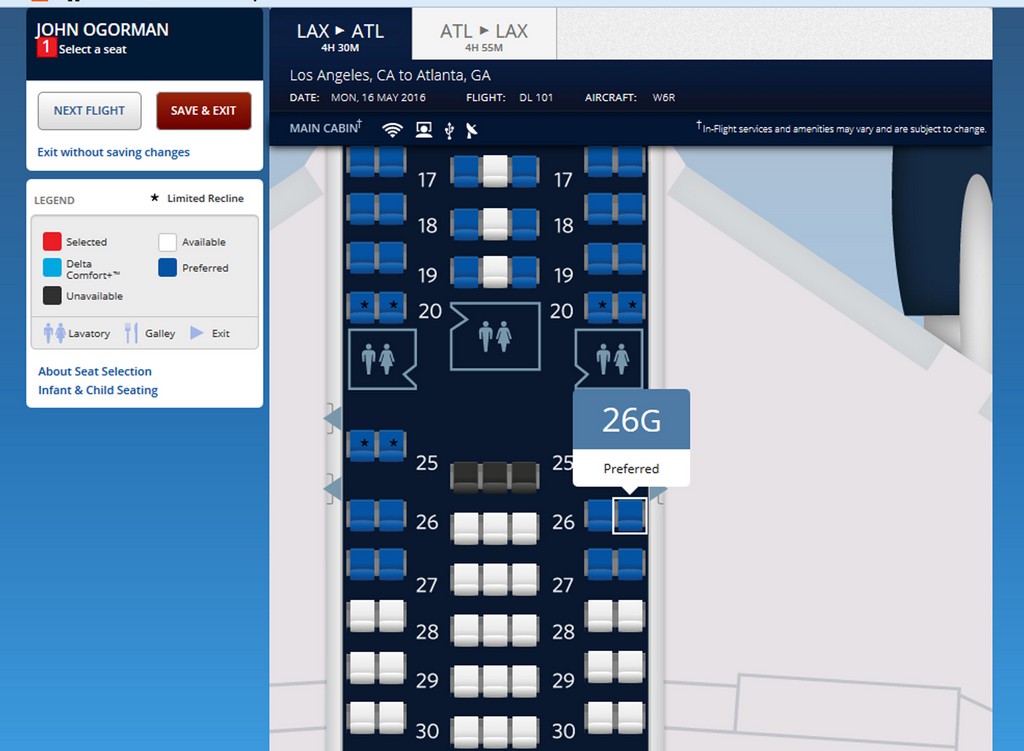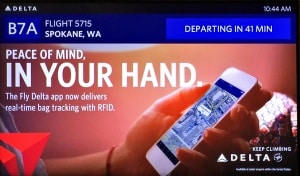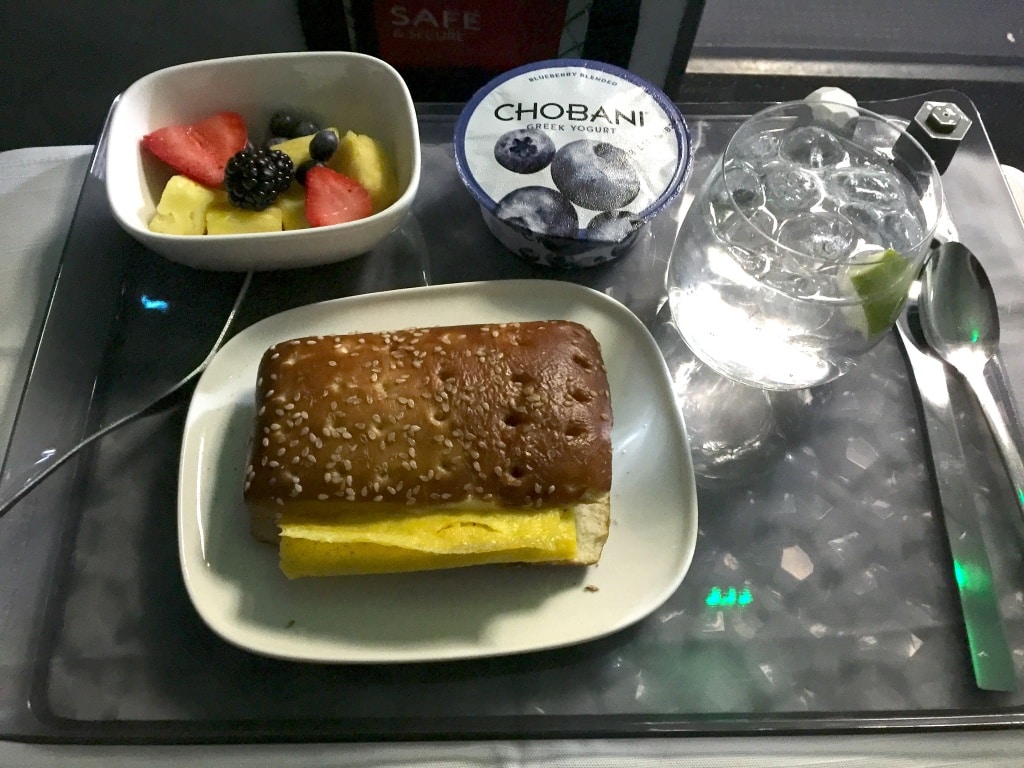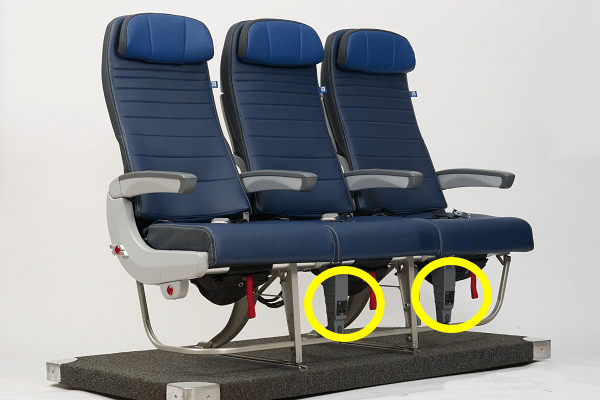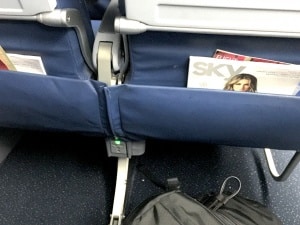Given my disgust for United, I decided to look for a few alternatives. Since I travel a lot (I’ve been averaging over 100k actual miles flown per year for the past 6 years) I need to have something that is going to make the flying buses just a little less onerous.
Unfortunately, there are very few choices nowadays. There are some of the smaller “discount” carriers, and I was willing to give some of them a shot. I did actually want to try Alaska and Virgin America, but unfortunately Virgin was sucked up into Alaska, and Alaska will no longer service my home airport.1
This left American and Delta, and since American purchased USErr (or USAir, as they marketed themselves), that crossed them off the list. I would rather walk than take USErr.
So, back in May I started to fly Delta and see if it would be worth switching over from United. Like all companies, there are good things, and there are bad things, but if you are thinking about doing what I’m doing, here are a couple of things that you certainly need to know.
Note: If you are thinking about doing a status match, the best time of year to do it is in November/December, or as early in the year as possible. Read on to find out why.
A Word About Status
By April of 2017, I traveled enough to reach Gold status (50,000+ actual miles) on United before switching to Delta, where I earned enough to reach Platinum (75,000+ miles) by November. So, I’ve spent quite a bit of time in airports and on airplanes.
For Road Warriors (and I’m not even close to being in the top tier, here), status means a great deal. It can mean anything from being able to select the seat you want (or, as is often the case, avoid the seats you don’t want), to where you are on the upgrade list. It can also mean what kind of complimentary perks you are eligible for, as well as amount of bonus miles you accrue when you fly.

Delta and United treat the blue seats quite differently.
One of the key things about status, too, is when you board. United, for example, overbooks nearly every single flight. What’s more, they act as if they’re doing you a favor by doing so, and it’s this very policy that forced my hand to look elsewhere. When you board isn’t about being first in line, it’s about making sure that you have the ability to keep your stuff with you. By being able to board towards the front of the line, you don’t have to worry about being forced to check your bag because all the overhead bins are full.
When you are pressed for time during a layover, it can become very anxiety-ridden to stand and wait for your bag to be “valeted” on the jetway, believe me.
Status Match
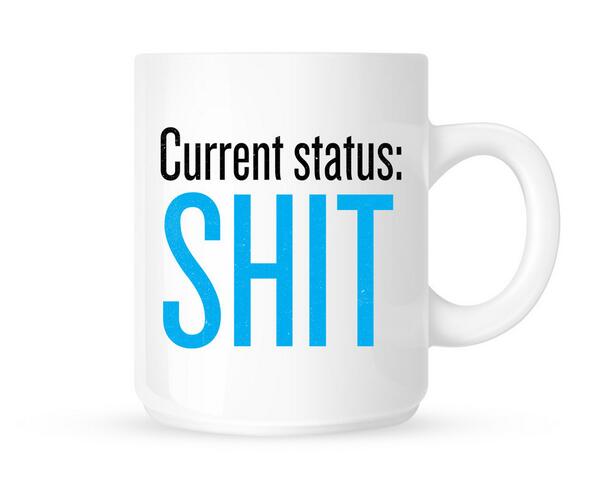
Common airline travel
Delta offers a “status match,” and since I was Premiere 1K I was happy to hear that. However, it turns out it was less of a ‘status match’ and more of a ‘demo.’ In order to maintain my status, I needed to fly 18,750 qualification miles in 90 days.
Unfortunately for me, my travel schedule for that time period was relatively light, so I was granted Silver status on Delta for the remainder of the year. It’s a shame, because I’ve been on at least 4 Delta flights nearly every week since then (as of this writing I’ve been on just over 60 flights since June).
Believe me when I tell you that the status can matter very much. To that end, let’s take a look at how you can get status for either airline.
Status Levels
Both United and Delta have similar qualification matrices, but as always, the devil is in the fine print.
United Premiere Status:
You can earn qualification credits (miles, segments, and dollars) from United’s partner airlines, but you will have to make sure that you have the correct ticket class, and you will have to purchase your tickets through United in order to gain that credit.
United’s segment requirement is also ridiculously low. In order to reach any elite status you simply have to fly on 4 United-branded segments per year (as opposed to a partner airline). If you’re flying enough to reach status, this is a no-brainer. Even so, United waives this requirement with the credit card as well. See below for more information on waivers.
With the Presidential Plus CC, you get 1k PQM for every $5000 you spend. These miles will expire after 3 years, but at least you don’t have to use them immediately.
One key thing to note is where the top tier travel actually begins. United has another, special unlisted class called “Global Services,” which roughly approximates to the new Diamond Medallion status that Delta appears to be aiming towards. This, of course, means that there is no equivalent of Premiere 1k, per se, on Delta.
Delta’s Medallion Benefits:
This can be pretty significant, actually, as both airlines’ key benefits kick in at the upper-most tier. Both airlines have a multiplier for flights that you take that add on to your frequent flyer mileage. Both United and Delta offer 11x the amount of frequent flyer miles (based on the price of the ticket), but United allows you to enjoy that benefit once you’ve flown 100k miles, while Delta forces you to wait until you’ve flown 125k miles.
Advantage: United
Rollover Qualification Miles

January 1
One of the nifty things that Delta provides is something called rollover qualification miles. That is, as long as you qualify for Silver status (i.e, accrue enough qualification miles and meet the qualification dollar requirement), any overage of qualification miles that you fly is automatically rolled over to the next year’s allotment.
Say, for instance, you narrowly miss making Gold by 5000 miles (20,000 miles for Silver, 45,000 miles instead of 50,000 for Gold, for both airlines). United effectively says, “screw you, you’re starting over” on January 1. You’re back to zero. Delta, on the other hand, rolls over the 20,000 miles you had earned beyond the Silver requirement. That means that on January 1, you only have 5,000 miles to go before you qualify for Gold (plus the dollar requirement, of course).
Advantage: Delta
Qualification Waivers
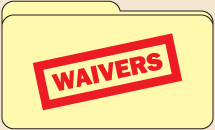 Both airlines have waivers for qualifying based upon whether or not you have a certain type of credit card. For United, simply having a card waives the dollar amount for Silver, Gold, and Platinum (you still have to meet a dollar requirement for Premiere 1K status, however).
Both airlines have waivers for qualifying based upon whether or not you have a certain type of credit card. For United, simply having a card waives the dollar amount for Silver, Gold, and Platinum (you still have to meet a dollar requirement for Premiere 1K status, however).
United allows you to get additional qualification miles and waivers by using their United-branded credit card. There is also a 4-flight minimum that has to be taken on United-branded flights, but that is waived with holders of the Credit Card. The minimum PQD amount is also waived for Presidential Plus credit card holders, or if you spend $25k on any other MileagePlus Credit Card, for every status level except for 1k.
There is no waiver for the PQD amount for Premiere 1k.
Delta has a waiver program as well, depending on the type of Credit Card you use/choose. Interestingly, it’s more difficult to get waivers and mileage credit with the more expensive card you choose.
 First, it used to be that spending $25k on any Delta-branded Credit Card would waive the dollar amount for any Medallion level, including Diamond. Then, for 2018, they changed the way they handled waivers for Diamond Medallion holders2 such that instead of $25k spending for the waiver, you now need to spend $250,000.
First, it used to be that spending $25k on any Delta-branded Credit Card would waive the dollar amount for any Medallion level, including Diamond. Then, for 2018, they changed the way they handled waivers for Diamond Medallion holders2 such that instead of $25k spending for the waiver, you now need to spend $250,000.
I suppose it should be noted that United doesn’t even grant any waiver for 1k, so I suppose it’s… better?
Like United, Delta offers a range of Credit Cards. There are only two that offer bonus miles and waivers, however: the Delta Platinum and the Delta Reserve. Unlike United, which allows you to gain 1,000 PQM for every $5k in spend and hold onto them for 3 years, Delta makes you wait until you spend $25k, at which point they give you 10,000 bonus miles and 10,000 MQMs all at once with the Platinum card. With the Reserve card, they give you 15,000 bonus miles and 15,000 MQMs, but only after you spend $30k on the card. I suppose the benefit here is that Delta offers you to roll them over, so it makes up for the lack of flexibility.
Advantage: United
Qualification Dollars
One more thing of note, here. Both airlines require you to reach a certain amount of “Qualification Dollars” – that is, you have to spend a certain amount of money on your tickets in order to have that amount apply towards your status level. However, neither airline actually uses the total cost of the ticket – taxes, fees, etc. don’t count.
The thing is, it is much harder to qualify the dollars used for a Delta ticket than a United ticket. You may pay for a $500 flight, for instance, and only have $16 go towards the qualification dollars (as has happened to me more than once).
Advantage: United
Before The Flight
Seat Selection
This is something where United shines over Delta, hands-down. For one thing, when you book your flight, you are able to choose the seat that you wish at that time. Delta forces you to wait at least a day before you can select your seat. This was true when I was matched at Platinum as it is at Silver, so no grace for having status, there.
Both United and Delta have two different economy seats. One is pure steerage, with barely enough room for you to sit properly without your knees hitting the seat in front of you (forget about getting into “crash position”), and the other is a slightly upgraded version (called “Comfort Plus” in Delta-speak, and “Premium Economy” for United)

United allows you to select Premium Economy seats at the time of booking. They’re complimentary if you have any elite status.
If you have status on United, you can select any of the Premium Economy seats at the time of booking with no waiting period, and for no additional charge.
With Delta, however, such is not the case. First, when you book with Delta, you have a waiting period (as I mentioned, about a day) to select your seats. Even then, you can only select the seats that are not in Comfort Plus. You can pay to upgrade (even if you have status), or you can put yourself on a list to be upgraded to Comfort Plus if there are empty seats at departure (I have to be up front here – this one issue almost made me give up and return to United in frustration). Turns out, this really upset Delta frequent flyers when it was announced in 2016, too.
Exit Row Seats
Notably, United treats exit row seats as Premium Economy seats. That means the seats directly in front of the exit row can be “normal” Economy, but they treat the exit rows as Premium. Delta, on the other hand, treats exit rows as “normal” economy. This is interesting, but leads to some strange and unintended consequences, particularly with upgrades.
Advantage: United
Seat Upgrades

Who doesn’t like upgrades?
With United, the upgrades at flight time are very straight-forward. If you have high enough status and have paid for a high-enough priced ticket, you may find yourself in the blessed position of getting an upgrade to first class if there are available seats. When United merged with Continental 3 the frequent flyers for both airlines collided with a massive bang; there are so many people on the waiting list, that you have to be a true Road Warrior, or be on a less-travelled route.4
Generally speaking, unless you are Premiere 1k or Global Services on United, you don’t have a snowball’s chance in hell of getting an upgrade.
Delta’s approach is much more complex, due to the way that they allocate seats. However, it can also be much more rewarding. There can also be unfortunate consequences. Because of the way they treat the Comfort Plus seats, they offer a list for upgrades to those seats, in addition to upgrades to First Class.
So, what this means is, when you book a flight on Delta, and you cannot select your seats straight away, you can select the option to be put on the complimentary upgrade list for either First Class or Comfort Plus, or both. Why would you not want to put your name in for both? That goes to the unintended consequences I mentioned earlier.

Free TV, not just for Comfort +
Remember that the exit rows for Delta are considered “normal” economy. That means that if you happen to select an exit row seat (legroom! Yay!), and you put in for an upgrade to Comfort Plus, it is possible (actually, it’s highly probable) that you will get “bumped” from a nice, roomy, aisle exit row seat to a (more) cramped, constrained middle seat in the Comfort Plus section. That’s right: Delta considers moving from an aisle exit row seat to a middle seat in Comfort+ an “upgrade.”
This happened to me several times before I realized what the connection was.
So, if you happen to be flying Delta, and also happen to be getting an exit row seat, you very likely do not want to be upgraded to Comfort Plus – as those seats will almost always be taken except for the middle seats. Worse, you can’t decline the upgrade, because they give away your exit-row seat to someone else on standby.
Having said that, Delta is far more generous for upgrades to First Class than United – by a long shot. After my demo period ran out, and I was relegated to Silver Status, I thought I would never see another upgrade again. However, my first two flights as Silver were both upgraded to First Class!
I was stunned; I still am, in fact. Since I started flying Delta exclusively in June I have been upgraded to First Class no fewer than half-a-dozen times while at my Silver level. There is no way in hell any Silver Elite member is going to be upgraded on a typical United Flight. In fact, as Premiere 1k, I have only been upgraded on about a half-dozen flights in the previous two years.
Advantage: Delta
Life on the Planes
Boarding Process
Both companies’ boarding processes are straightforward. For United, they will board Global Services, then Zones 1 through 5. First Class, Premiere 1k, and Platinum status customers are granted Zone 1, and Gold, Silver, and credit card holders are Zone 2. Everyone else is Zone 3-5.
Delta’s boarding process is a little bit different. They, too, use zones, but a different naming system. “Premium” is Diamond Elite (something of the equivalent of the combination of Global Services and Premiere 1k for United) and First Class, “Sky Priority” is Gold and above, and Zone 1 is Silver.
To put it another way, Zone 1 is great on United, not-so-great on Delta. However, this is just about calibrating which heat your group starts, that’s all.
One of the things about United’s status qualification, however, is that Zone 1 is reserved for First Class, 1k, and Platinum status members, Gold and Silver are in Zone 2 (Global Services get their own special pre-board category, but as that’s usually between 1-4 people at any given point in time, it’s not a huge wait).
On Delta, the first boarding call is for First Class and Diamond Medallion holders, Sky Priority for Gold and Platinum, and Silver is Zone 1 (or, to put it in United’s terms, Delta forces its Platinum holders to board in one priority less than United).
Advantage: United
Boarding Queues
United has a very good system in place. If only they would actually follow through with their own rules.
Their boarding system (Zones 1-5) is intuitive and aside from a few airports where the queues are too cramped for comfort, it’s a process that is easy to follow and streamlines the boarding process.
Delta started introducing these same zone queues recently, but apparently it takes a bit of a learning curve for the passengers to realize that the “zone” on their ticket is supposed to match the queue name. That’s more the idiocy of the common traveler than any fault of Delta, however. I expect that over time with more of Delta’s gates using this system it will become more intuitive.
On the other hand, Delta is far more aware and cognizant of how sneaky travelers try to be. I’ve seen a number of occasions when the agents have forced oversized luggage to be checked (a personal pet peeve of my traveling experience is when people bring “carry on” luggage that they can’t carry, much less lift), and have held people to the side who try to line jump. I’m convinced that United’s gate agents either don’t understand or don’t care that their negligence is a major contributor to United’s horrific on-schedule departure times.
One of the interesting things about Delta, too, is that they have very good, and accurate, notification systems (see also the Mobile App section of this review). The information screens are very good at giving you enough of an awareness of what’s happening so that you can make plans (go grab food, make a rest stop, etc.).
Advantage: Delta
First Class
In this area, Delta also wins. United’s First Class seats for domestic travel appear to have been recycled from plane to plane since the 1980s. Tray tables tilt, slant, or otherwise fail to provide a solid surface for eating or working on laptops. Generally speaking, on domestic flights, First Class really hasn’t felt like what you’d expect it to be.
Delta’s options, on the other hand, are quite comfortable, and the tray tables (depending on the plane you are on) are solid. When they bring food, it’s often on a tray with a rubberized no-slide surface that is fantastic. Compared to United, where things slide all over the place, with Delta when you put something down on the tray, it stays there.
Delta’s first class seats are far more comfortable, and gaining an upgrade actually feels like you’ve gotten a real treat.
Advantage: Delta
Seat Comfort

United’s slimline seats are awful.
Starting last year, United began replacing its seats with a new Slimline version. I’m not going to mince words here: I hate those seats. The curvature of the seat, plus the reduced padding, gives me about a maximum of 2 hours before my back starts to kill me and my ass falls asleep. Flying across the country in slimline seats is an unmitigated nightmare.
Juxtaposed against this are the older, bulkier, and (quite frankly) poor-conditioned First Class seats. United has spent a great deal of time and money updating the First and Business Class seats for international travel, and the one time I managed to fly the 787 to/from Australia from the US was quite nice even though I was in Premium Economy. But for domestic flights, however, United’s seating is simply terrible.
Delta’s seats are much better, comparatively speaking. Aside from the atrocious legroom in regular economy (a trait that United shares, sadly), the seats are generally more comfortable for longer flights. They are not much thicker than United’s SlimLine seats, but they are far better for posture, comfort, and ass health.
Advantage: Delta
Seat Power
Both airlines provide power, though I’ve been on far more United planes without power than Delta ones. In fact, out of the 50 flights I’ve taken on Delta this year so far, only 2 have not had power outlets.
United places the power between the seats that you are sitting on, which leaves you trying to find the insertion holes blindly. Given that this means that you are often trying to maneuver your way around the legs of your companion, this is awkward at best.
Delta places the seat power in between the seats in front of you, so that you can actually see where the plug is, and you aren’t running the risk of molesting anyone. What’s more, a lot of the time, in fact, United’s power outlets don’t work at all. I’ve yet to have a Delta plug inoperable.
Advantage: Delta
Amenities
Entertainment
Delta wins, hands down. First, the seat-back televisions are as big in steerage as they are in United’s first class. Bigger, actually, in many cases. Entertainment on Delta is also free, whether you are including the wifi-based entertainment system or the seat-back televisions. United will allow you to watch their entertainment from their application using their wifi, but will charge for any seat-back television access unless you are in first class.
Advantage: Delta
Soda Generosity
United wins here. Simply put, Delta is very stingy about handing you a can of soda. Asking for the can usually prompts a disapproving tone and look from the flight attendant.
Advantage: United
Customer Service
Flight Attendants and Gate Agents
There doesn’t appear to be much difference in the flight attendants between United and Delta, to be honest. Both airlines spend a great deal of time, energy, and focus making sure that their customer service representatives on the planes are excellent, and it shows.
 Gate agents, however, could stand additional training in the art of human decency for United. There are some notable exceptions, of course, but by and large United gate agents are terrible. It was the Gate Agent, for instance, who was so horribly out of line to Dr. David Dao (check name) in Chicago. It was a United gate agent who deliberately told me the wrong gate to go to when my inbound flight was delayed and I was pressed to make the next flight. It was the United gate agent who refused to go check my seat after I accidentally left my laptop on the plane (but realized as soon as I left the jetway). It was a United gate agent that got in hot water for assaulting a Chinese tennis player. This list goes on.
Gate agents, however, could stand additional training in the art of human decency for United. There are some notable exceptions, of course, but by and large United gate agents are terrible. It was the Gate Agent, for instance, who was so horribly out of line to Dr. David Dao (check name) in Chicago. It was a United gate agent who deliberately told me the wrong gate to go to when my inbound flight was delayed and I was pressed to make the next flight. It was the United gate agent who refused to go check my seat after I accidentally left my laptop on the plane (but realized as soon as I left the jetway). It was a United gate agent that got in hot water for assaulting a Chinese tennis player. This list goes on.
United does not size-check bags, which leads to grotesquely oversized baggage being brought on board, nor do they forestall line-jumpers. Generally speaking, United needs to start a secret shopper program and overhaul its gate agent program.
While I’ve seen some oversized bags on Delta flights, it’s demonstratively better organized. Their gate agents pay far more attention when people board, refusing line-jumpers and ridiculously oversized bags to board.
Customer Service Representatives (phone)
United has a slight (very slight) edge. Both companies have provided excellent service when trying to call. Most of my interactions with Delta have been as a Silver status member, whereas my interactions with United have more often been at the Premiere 1K level. As a result, my comparison isn’t entirely an apples-to-apples one.
By and large, I’ve had mostly extremely helpful interactions with Delta, but there have been a couple of occasions of note when the agent on the phone was less-than-helpful. The most recent interaction went like this:
Me: “I’m having a strange situation where some of my miles are not getting credited to my account towards status. It’s strange, because the error message that I see is that my name does not match the one on the itinerary.”
Agent: “Yes, when your name doesn’t match the one on the itinerary, we need to manually fix the miles so that you get credit.”
Me: “It’s strange, because I will get credit for the miles on the second half of the same itinerary, but not the first half.”
Agent: “So, on the same itinerary, you’ll get credit, but then the other flights will say the name doesn’t match?”
Me: “Yes. I had to get this fixed recently – my last trip, in fact.”
Agent: “That’s not possible.”
Me: “And yet it happened.”
Agent: “No, it’s impossible. You’re wrong.”
Me: “I don’t know what to tell you, other than to say that it’s not just possible, it happened on my last trip.”
Agent (agitated): “No, you’re wrong.”
Me: “Do you have access to the notes from the last agent I spoke with?”
Agent: “I don’t see anything here, let me check with the tech support.”
[3 minutes go by]
Agent: “The technical guy said this is a known issue and we are trying to resolve this in the next update. Is there anything else I can help you with?”
What I wanted to say was, Yes, you can volunteer for customer service training, learn how to apologize, and pick up a copy of How To Win Friends And Influence People.
So, Delta still has a ways to go with some of their reps, but on the whole I don’t want to malign their entire crew. Not every encounter has been like this, but there have been more than just a couple of reps that made me feel like they were doing me a favor simply by answering the phone.
Advantage: United
Mobile App
Both mobile apps are decent. I found United’s to be more intuitive, but Delta’s application is almost always correct.
This is very useful.
Here’s what I mean – with the proper settings on the app, Delta will notify you when your flight is boarding, what gate it’s boarding at, when your bag is placed on the flight, when it’s put on the carousel (if you check it), and I have yet to be given bad information.
I’ve also noticed that Delta’s notifications are immediate. As soon as the gate agent says that we are boarding, the app sends an update. The coordination for that to happen, not to mention the consistency across the personnel, is impressive to me.
United’s app on the other hand, is notorious for being dead, dead wrong. On several occasions the app has directed me to not only wrong gates, but wrong terminals. Updates and change notifications can take hours (no, I’m not kidding), and you take a grave risk relying on the information for any kind of timely changes or important notices with the United app.
Advantage: Delta
Flying Clubs
When you fly a lot, the airport becomes your office. You are always at the mercy of your layover schedule, which can often be far, far too tight, or on occasion way too separated. Recently, for instance, I was faced with a choice of having a 20 minute layover (and going to a different terminal) or a 12-hour layover. Fortunately, these kinds of things are relatively rare, but they do happen.
My layovers with United were almost always 2-3 hours, so I took extensive use of the United Club system, both domestically and internationally.

United Club, Denver
United has been trying to update their clubs, and they have been slowly introducing a few more amenities into their offerings. Previously, you might get a bagel or fruit along with coffee and soft drinks, but they’ve been adding in some ‘real food’ during the course of the day. It’s always a treat, so to speak, to travel Internationally, though, because the food is always much better, and they have better selections of complimentary libations (i.e., they offer self-service liquor and beer in the international clubs).
One of the things that I’ve noticed with Delta – and this is entirely subjective because my flight schedules simply happen to fall this way most of the time – is that I usually don’t have extremely long layovers. I may have an extra 20 minutes or so here and there, but that’s not often enough time to really enjoy a rest in the Club. As a result, I’ve only had one opportunity (so far) to visit a Delta club.

For more extensive selection
The first thing I noticed about the Delta club was that it looked and felt far more like the International lounges than United’s domestic ones. There were some really interesting, funky chairs that were available, and even though the place was packed, it didn’t seem crowded. There was a lot of room for moving around with luggage, and you didn’t feel like you were climbing over people.

These weren’t even the funky-looking seats
We shall see how much more I have an opportunity to use Delta’s lounges in the future, but with only one data point I hesitate to make a sweeping generalization about which system is better. If the rest of Delta’s lounges are like LAX, however, I think the answer will become pretty clear.
Advantage: Not Enough Information
Baggage Handlers
United breaks guitars. ‘Nuff said.
[youtube=”https://www.youtube.com/watch?v=5YGc4zOqozo”]
Advantage: Delta.
International Flights
Unlike United, Delta doesn’t have very many (if any) international flights, and relies very heavily on partners. United’s international flights are hit-or-miss. If you are lucky enough to get on one of their new 787s, it’s quite nice. If not, you may find yourself on a plane that may not be 40 years old, but it certainly looks and feels that way.
2017 was the first year in more than 20 that I did not take an international flight, so I was unable to test out Delta’s partners. United relies very heavily on Lufthansa for it’s European partnership, and over the years Lufthansa has gone from a top-tier, envy-inducing airline to rude, obnoxious, and frustrating as hell. I will not miss them.
I currently have two international flights scheduled for 2018, and I’m looking forward to seeing what those are like in comparison. At this time, though, I don’t have enough information for an evaluation or comparison.
Advantage: Not Enough Information
Bottom Line
It’s important to remember why I went through this exercise in the first place. All things being equal, it’s not clear from this list why it’s worth switching from United to Delta.
However, let’s revisit one important fact: United continues to show just how much it doesn’t care for its passengers:
- United first-class passenger threatened with handcuffs to make room for “higher-priority” traveler.
- United apologizes to gay passenger falsely accused of having hands ‘too close to son’s genitals.’
- United Airlines Accused Of Mistreating Sick 94-Year-Old
- United Airlines Employee Accused of Kicking Woman in the Head (While She Was Sleeping)
- United employee pushes 71 year old passenger to the ground
- Musician claims United supervisor attempted to take her violin during check-in
- And of course, no one is ever fired at United for bad behavior.
As I wrote about before, I cannot do much – but at least I don’t have to contribute to United’s bad behavior. United will never see my departure, will never feel any punishment. But neither of those are the point.
But back to being practical…
If you are considering leaving United, whether your reasons be the same as mine or not, and you are looking to do a status match, I recommend you do it in November or December (that is, at the time of this writing, right now), or early on in the calendar year. Your requirements for obtaining elite status is not pro-rated throughout the year, so if you do what I did – switch mid-year – you will be pressed to fly enough to maintain any status you obtain in the “demo period.”
So far, the flight experience on Delta has been better (I’m talking about the actual flying time), with more comfortable seats, and more upgrades to a first class that seems worth the upgrade. Delta could stand to have much-needed improvements for the way it treats its elites in the seat selection, to be sure, and is not perfect. But so far it doesn’t appear that anyone is afraid of getting handcuffed and beaten to a bloody pulp.
- Southwest Air seemed like a logical choice, considering the routes they fly are exactly where I need/want to go. However, my experience with Southwest has been less than stellar. Not only are they only marginally better than Ryanair, but when things go wrong Southwest is horrible at making them right again.
- I’m not kidding when I say they went over the top for this. You can see this in their T&C: “We are always looking for ways to improve the Medallion experience.” (Emphasis mine)
- Purists will say that Continental bought United, and they are correct, but for all intents and purposes that detail does not matter.
- I wish I were making this up: on one flight there were more people on the 1st Class upgrade list than there were seats on the plane. Gotta love United’s overbooking policy.

